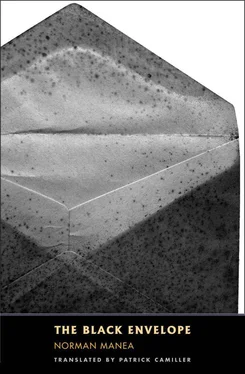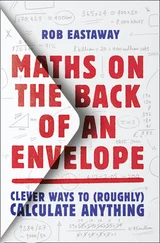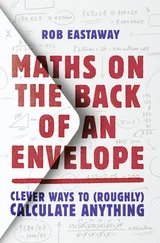“Of course, we also have a listing by occupation. By age, by social origin, by occupation, by work performance, by education, by family life, by sport — yes, yes, even by sport, that’s important. Every aspect is covered. Life at work, life in any organizations, political formation, military training, specialist training, emergency training, intervention training. Yes, we do have some photographers, as far as I remember. A few have even worked with us on the paper. I know those people better. And the others can be found in the listings — of course they can.”
But just then the door opened. Flashback, with sighs. “Oh, it’s you.” “What the devil!” “ Mamma mia! ”
So the visitor was no longer in the charge of all-knowing Ionel. Comrade Ionel confined himself to giving him the last two issues of Via¸ta Noastr  .
.
“Here, they might be of interest to you. Mrs. Radovici will take you upstairs for the information — I see you know each other. Irina, make sure you tell Iopo that the Comrade Secretary has spoken with the comrade. So Iopo should put him through to listings: he should be shown the occupational listing, that’s all. Nothing else. No need for the files. Just the occupational listing. Iopo will understand what it’s about.”
Pushing, laughter, frolics. Keep pressing the old buttons. “What a surprise, Ira! Is it really you? I’d completely forgotten. You know what I’m like.” “It’s normal, Tolea, quite normal. Yes, I’m here in the mousehole, as you knew perfectly well. In this poisoned hole for mice.”
So Mr. Vancea came to the tram stop again. He waited impatiently for the tram, climbed aboard, found a free seat by the ticket seller, opened the newspaper. He leafed through the pages; the phantom Octavian did not appear, nor the president Orest Popescu, nor the name of Irina Radovici. What could Ira be doing at that creepy Association? Designing special-announcement boards, posters, or graphic displays of its achievements and tasks? Or producing dummies for festive issues? And why the same old hatred of the comrade general and tailor in the reserve, Popescu? Has she still not shaken him off? And where could Señor Octav have got to? Why weren’t his portrait and eulogy among all those leaders and model workers? Mr. Vancea kept reading and reading, bent over the pages, although he had long since got off the tram.
The photographer Octavian, then, does not appear in the foreground; he prefers to lose himself in the blurred mass of the sect’s members. He must be used to mute efficiency, among so many exemplary members of the model organization. Just miming and code? Was he, in fact, just acting out his basic character as it already revealed itself forty years ago? Opaqueness, deception, seclusion, lack of humor? Rage against the frivolous, complicated, shabby world which manages to muddle through in the end? Hatred of the beauty he covets, the intelligence that humiliates him, the goodness in which he does not believe? Is the Model Association precisely the ideal occasion, the ideal mask? A way of carrying through the dark initiation into which he threw himself in youth? The legion of frustration? Mystery and imprecation and wounded vanity?
Mr. Vancea shifted his weight from one foot to the other, searching the paper in which he found no answer. Its language perfectly resembled the model used by every paper available up and down the country; not the slightest difference could be glimpsed. Did the special status operate under the banal cover of perfect adaptation to the surrounding environment? Had the model seed bed of the underworld been created so as gradually to complete the sect’s organization, to consummate its potential for intervention? That would certainly suit the photographer Octavian. But what about the others? How do they receive and how do they understand the standard instructions? Does the amputated structure still have any resources of ambiguity? Or are they just model operatives, always focused on the immediate goal and the minimum necessary for successful completion? Armored in their own isolation, in which there are no deviations, detours, or postponement, no playful jokes, no backbiting or disputes, no hesitations or dilemmas? Just the gruffness of the instruction, the elemental act. But what about festive recitals, the taste for spectacle and mirage? What about their immediate, and essential, needs?
Don Octavio ought to explain how he has changed or fulfilled the times in which he has evolved. He would like to offer suggestions about the future in store for us. A minimum of communication: muteness, sign language, pictures, merely figurative imagination.
But what about unforeseeable reactions, strangled instincts? A wild, random outburst at an uncontrollable moment, when the crowd suddenly begins to hop and skip and shout, to destroy everything on the way? Should there be advice, requests, and dialogue only for centuries gone by, for those whose hearing loss did not exceed 40 decibels? Even that is a diversion, probably, a false provision in the statutes. Diversion, diversion, network, network, mumbled Detective Vancea, swaying from one foot to the other in front of the telephone booth.
He looked incredulously at the newspaper, on which he had noted down two addresses and telephone numbers. How could they speak on the phone, those exemplary deaf-mute members? Or maybe their children do the speaking? Does Octavian, too, have children? Has he adopted one to make the double game more sophisticated, as the operational plan requires?
He went into the booth and dialed one of the numbers. It rang and rang. “Maybe it’s another number. Have I gone soft in the head? Was it her number instead of his that I wrote down — Mrs. Radovici’s? Who isn’t Mrs. anymore, she’s Irina again. Irina — again Irina.”
After half an hour the detective repeated the attempt. He no longer had the newspaper in front of him. He had lost it, of course, but he could still remember the number. Or could he? Tolea’s memory was like Tolea himself.
MRS. VETURIA GAFTON WASnot very audible, or visible: it was not easy for her to be seen by neighbor Vancea. But she existed without a doubt, in everything, all the time.
The absence of the tiny lady became like a permanent feature, coded and mysterious. But when she finally appeared, she seemed to contradict the magic through which she had taken on flesh and blood. An absolutely concrete and perfectly ordinary apparition: Mrs. Doctor Gafton. Not only did the banality of her presence not contradict, it actually heightened the insidious power of her absence. That power suffused the vibrating silence and the sound rhythms of domestic messages; it imperceptibly radiated through the whole household, strangely and constantly migrating — there was no way of confronting it. A vast, faint pulsation — until it suddenly burst forth in the gurgling of the tap or the shaking of the window in a storm, in the leavened madness of long summer afternoons of blazing heat, in the languor of red wine in glasses, in the diaphanous invasion of dandelion fluff spinning sweet whirlpools of nothingness in front of a suddenly opening door, amid an unheard sighing of hysterical walls.
Morning movements of the Gafton couple in the bathroom? It did not necessarily mean that Dominic had actually heard a brooch dropping in the washbasin or the xylophone of slippers striking the tiled floor. Was it a sound that clearly belonged to the realm of the immaterial? Not at all! Just the diffident steps of a skinny pensioner, the rustle of towels being changed, grunts, comb and brush and shaving implements, and the clinking of a razor against the mirror. Which did not mean that his spouse was not beside him or had not been or would not be.
Читать дальше

 .
.










